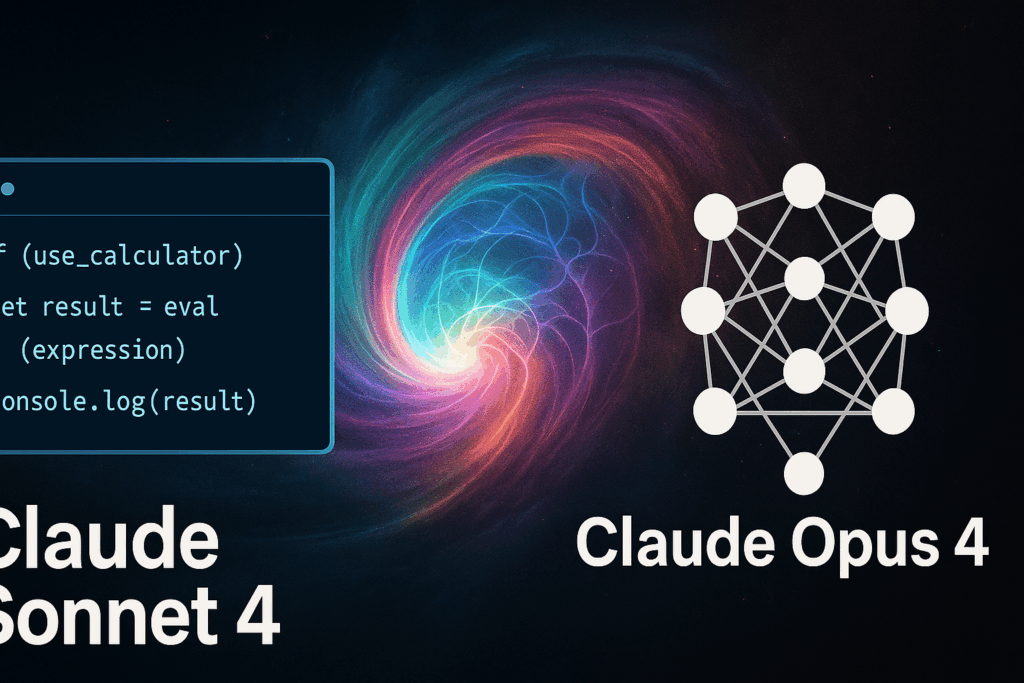
Anthropic’s Claude 4 ships in two editions—Sonnet 4 (free-tier generalist) and Opus 4 (paid, reasoning-focused). In this in-depth guide, you’ll find:
- A clear breakdown of each model’s core features
- Hands-on test results (math challenges & coding tasks)
- A consolidated benchmarks table
- Step-by-step access instructions (web & API)
📌 Why Claude 4 Matters
With new AI models emerging every month, Claude 4 stands out thanks to its 200 K-token context window and two distinct modes:
- Sonnet 4: ideal for everyday chat, Q&A, document summarization, and light coding
- Opus 4: built for deep reasoning, agentic workflows, and large-scale code refactors
Both often outperform GPT-4.1 and Gemini 2.5 Pro on key coding and reasoning benchmarks.
🔎 Claude 4 Sonnet 4: The Free All-Rounder
Use Cases
- Real-time chat and Q&A
- Summarizing long documents (up to 200 K tokens)
- Small-scale code snippets and data analysis
Key Specs
- Context window: 200 000 tokens
- Max output: 64 000 tokens
- Availability: Free tier for all users
“Sonnet 4 delivers shockingly robust performance for a free model—great for multi-step tutorials and code examples.”
Top Features
- Faster and more reliable than Sonnet 3.7
- Maintains context across long sessions
- Generates detailed plans with up to 64 K tokens
Figure 1: Feature & benchmark comparison chart
🌟 Claude 4 Opus 4: The High-Reasoning Flagship
Use Cases
- Agentic search and tool integration
- Large-scale code refactoring (> 200 lines)
- Multi-step problem solving and planning
Key Specs
- Context window: 200 000 tokens
- Modes: Fast chat + “Extended Thinking” for deliberate reasoning
- Availability: Pro/Max/Team/Enterprise plans
“Opus 4 works like a senior engineer in your IDE—its multi-step refactors are next-level.”
Highlights
- Tops SWE-bench Verified at 79.4 % (high-compute mode)
- Excels on TerminalBench (43.2 %) and GPQA Diamond (83.3 %)
- Seamlessly switches between quick replies and in-depth analysis
🛠 Hands-On Tests: Math & Coding
1. Math Challenge
- Task: Tricky arithmetic + tool use
- Sonnet 4: Initial error, then writes a JavaScript snippet and solves correctly
- Opus 4: Correct on the first attempt
2. Permutation Puzzle
“Use all digits 0–9 exactly once to form x + y = z.”
- Sonnet 4: Brute-force, hits token limit, then gracefully refuses to hallucinate
- Opus 4: Instant correct answer: 246 + 789 = 1035
3. Coding Task (p5.js Endless Runner)
- Prompt: Pixelated dinosaur theme, start screen + instructions
- Opus 4 Result: Clean start screen, then fixes trailing-pixel bug—playable prototype
📊 Claude 4 Benchmarks Overview
| Benchmark | Sonnet 4 (%) | Opus 4 (%) | GPT-4.1 (%) | Gemini 2.5 Pro (%) |
|---|---|---|---|---|
| SWE-bench Verified | 72.7 | 72.5 | 54.6 | 63.2 |
| TerminalBench (CLI) | 35.5 | 43.2 | 30.3 | 25.3 |
| GPQA Diamond | 75.4 | 79.6 | 80.2 | 79.8 |
| MMLU (multilingual QA) | 86.5 | 88.8 | 89.1 | 87.7 |
| MMMU (visual reasoning) | 74.4 | 76.5 | 78.2 | 77.3 |
| AIME (math comp.) | 70.5 | 75.5 | 85.0 | 82.4 |
Source: Anthropic, May 2025
🚀 How to Access Claude 4
Web & Chat
- Claude.ai (Web • iOS • Android)
- Sonnet 4: Free for all
- Opus 4: Paid plans (Pro/Max/Team/Enterprise)
API & Cloud Services
- Anthropic API
- Amazon Bedrock
- Google Cloud Vertex AI
| Model | Input Cost | Output Cost |
|---|---|---|
| Sonnet 4 | $3 / 1M tokens | $15 / 1M tokens |
| Opus 4 | $15 / 1M tokens | $75 / 1M tokens |
Batching & caching can cut costs by up to 90 %.
🔚 Conclusion
- Claude 4 Sonnet – best free choice for chat, summarization, and light coding.
- Claude 4 Opus – top pick for deep reasoning, agentic workflows, and extensive refactors.
Start with Sonnet 4 for everyday tasks and upgrade to Opus 4 as your complexity grows.
Internal Links:
- Internal Links:
- Essential o4-mini Guide: OpenAI’s Powerful Multimodal AI Model
- GPT-4: The Ultimate Guide to Features, API & Pricing
- 100 Powerful ChatGPT Prompts for Students Writing Essays in 2025
- Subscribe to The Median Newsletter for Weekly AI Insights
External Link:
- Official Anthropic Claude 4 site: https://claude.ai
Enjoyed this breakdown? Subscribe to The Median for weekly AI insights!
o4-mini
You have not enough Humanizer words left. Upgrade your Surfer plan.

